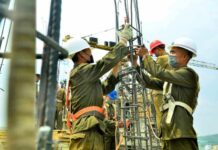North Korea is running into problems supplying raw materials and supplies due to protracted international sanctions and the suspension of trade in response to the COVID-19 pandemic. Because of this, North Korean authorities are aggressively pressing workplaces and citizens to recycle supplies to mitigate resource shortages.
On July 16, the Rodong Sinmun ran a six-page “political essay” entitled “Let’s Become Indefatigable Revolutionaries.” The fourth page included a section entitled, “To Save Is to Increase Production,” which deals with conservation and recycling. “Political essays” discuss important social and political issues “rationally and passionately” to the people. The publishing of the essay therefore suggests that recycling is now an important social and political issue in North Korea.
Contrary to what the North Korean authorities authorities think, however, locals give recycling an unenthusiastic response.
North Koreans have already been conserving or recycling supplies for quite some time due to resource shortages. Based on Daily NK’s conversations with people inside the country, they are responding coldly to the authorities suddenly pressing them to recycle without offering fundamental solutions to their problems.
One North Korean resident Daily NK recently spoke with by telephone said people were already recycling everything “even without the authorities having to tell them to do so,” and that they “snort every time the authorities emphasize recycling.”
Moreover, locals loudly criticize the authorities for trying to deceive the people with propaganda calling for recycling despite the fact that, apart from major companies, most workplaces have no supplies to recycle in the first place.
Daily NK recently interviewed two North Koreans – one living in Yanggang Province, with the other living in South Pyongan Province – about their government’s recycling policy.
Daily NK: Are you aware of propaganda, or attended lectures, regarding recycling?
Yanggang Province Resident (A): In accordance with a Central Committee directive in mid-February, orders were handed down in Hyesan and Samsu County, Yanggang Province, through the inminban [people’s units] regarding recycling. The order stressed that we mustn’t throw away resources when the nation is having a tough time. In particular, it stressed that if people find recyclable goods on the street or in their villages such as discarded vinyl [plastic], Chinese-made vinyl films, or discarded rubber, they should pick it up and deposit it at a place designated by the inminban.
South Pyongan Province Resident (B): I hear about it during every workplace lecture, so I’m sick of it. We’ve already been recycling, and would have been – even if they’d told us not to. What I’d like to ask [the authorities] is how they could ask us to do any more.
Daily NK: How are companies or government institutions conducting recycling activities?
A: Workplaces and government institutions don’t recycle [there’s just individual quotas that need to be met]. At workplaces and government institutions, they give each employee a yearly quota. They review how well you’ve fulfilled the recycling plan in the first and second halves of the year.
B: Places with a lot of raw materials or supplies such as copper or vinyl – like the March 26 Pyongyang Cable Factory or October 5 Automated Device Factory – can recycle. But ordinary workplaces have no raw materials or supplies, so how can they recycle?
Daily NK: Do people tend to separate their garbage at home?
A: People don’t usually separate garbage at home. They have no motivation to, so there’s no interest in it.
B: In North Korean households, we don’t even have a word for separating garbage. We’ll use a single plastic soft drink bottle dozens or hundreds of times. There’s nothing to separate for recycling. There are even places that sell just empty bottles in marketplaces.
Daily NK: Do you ever have to pay to throw away garbage?
A: Inminban take turns cleaning the garbage dumps once a month. At this time, each family has to pay money for transport [of the garbage to the place of disposal]. But the amount that needs to be paid differs from inminban to inminban.
B: Just as its name suggests, garbage [Korean: sseuregi] refers to things that have no use. So in North Korea, it’s never crossed anyone’s mind to pay money to throw away garbage.
Daily NK: They say if you bring scrap paper or discarded vinyl to shops selling daily necessities or government procurement centers, you can exchange it for goods from factories that need these discarded goods. Do locals often use this service?
A: In the days of Kim Il Sung and Kim Jong Il, you could exchange it for money or goods. However, since Kim Jong Un came to power, the government purchase centers exist in name only. They don’t operate as they should. And locals hardly ever use sundry shops or government purchase centers.
B: They give you money [not goods from factories]. But if you bring recyclables, all you get is sweat. You’re not compensated, so who would go through the trouble? That being said, some people who turn over scrap metal, scrap vinyl, and discarded glass – because they have to submit certificates showing the discarded goods have been sold to the government – do it because they have no choice.

















